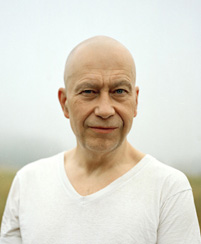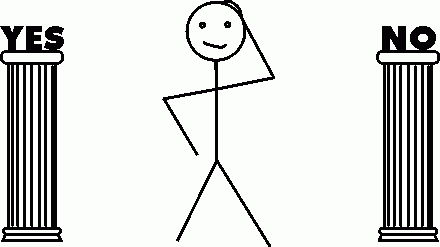There is a need to simplify complex situations somewhat, to gain an understanding of things at all, but for many people the tendency exists to over-simplify. The most common example is the practice of reducing every case to two choices - either/or, yes/no, black/white, and so on. Conventional logic asserts that every statement is either true or false, with nothing in between, which is called the law of excluded middle. And there are any number of circumstances where assuming this law is universally true will aid and simplify the process of our understanding. But there is a danger of carrying this too far. Albert Einstein warned us that we should make things as simple as they really are, but no simpler. And he also advised us that the solutions to the complex problems facing mankind can't be found in the same mindset or mentality that created them. Since his time, many of those problems have only gotten worse and yet more complex.
Perhaps sometimes there is good reason to doubt that two choices are enough, and to leave room for uncertainty. Maybe the natural choices should be 'I know it's true,' 'I know it's not true,' and 'it may or may not be true.' This is roughly equivalent to saying that some things are required to be true, other things are excluded from possibility, and a third group of things are possible but uncertain. This type of logic is sometimes called ternary, as distinguished from two valued or binary logic. But even three values are not always enough to represent the full nature of reality. Sometimes we must choose from four or five equally compelling possibilities, or avoid an equal number of possible unpleasant outcomes, knowing that in the end we must choose one. In such an instance, conventional logic fails us, and only a more sophisticated approach will yield any real understanding. Imagine if you were responsible for hiring someone qualified for a very important position. Perhaps, at the very end of a long sifting process, it would come down to a simple question like "have I chosen the right person for the job?" However, even then; all the other choices remain available, should you find that your first choice has already accepted another position. So rather than a true/false, right/wrong approach; a sort of estimation of each candidate's relative value or strengths, based on weighted averages, would serve you far better.
There needs to be a way to incorporate more subtlety into one's thinking if one is to make sense of modern life, but this is not impossible. On the other hand, there is clear evidence that some of the sensitivity we once had, to the subtleties in life, has already eroded. Today's young people distinguish fewer shades of gray, or other colors, than people once did, according to a study conducted over 20 years in Germany (at TÃ �bingen) - that was published in 1995. A more disturbing finding of that study is that errors of logic were more common in later subjects, who also were more willing to simply accept contradictions, rather than to search for a resolution or a common explanation to paradoxical elements of the situation. Sadly, many people don't even know there are choices beyond "any statement must be either true or false." However; almost all of those individuals have at least been exposed to the expanded concept of choices, on a multiple choice test.
In any case; modern life and today's world make it more important than ever to use the most sophisticated tools we have, to acquire and process knowledge. Instead of having either/or decisions, we are faced with an increasingly broad range of choices. But we are also faced with the challenge of determining whether we are dealing with a situation that actually makes sense - or not! You see; attempting to deal logically with situations or conditions that are illogical - at least in conventional terms - usually has less than satisfactory results. In fact; it is a kind of insanity, in modern times, to assume that everything in the world should, or must, make sense. Things often do make sense, in a convoluted or perverse way, but do not work in the manner they were intended, nor do they convey the meaning they were intended to have. This often happens with bureaucratic systems, as each person in a hierarchy might make sensible decisions - as pertain to the area of their purview - and still the overall result may be a maze of conflicting requirements, which has no self consistent logical pattern to it at all. That is; the conflicting requirements of each department create a game that cannot be won, leave a problem that cannot be figured out, or create a situation which is a disaster waiting to happen.
Of course; this does not leave people with a clear sense of direction, does not foster safety and progress, and leads to yet more complicated situations. To some extent; this is a result of a reduced expectation that solutions have to work entirely, or the perception that there does not have to be a plan for every contingency, as most unlikely events will remain unlikely for a long stretch of time. So both industry and government have implemented lots of half-way measures over the years, designed to handle the immediate situation, and there has been too little effort to attempt a more robust solution. The problem with that is there are no isolated systems. Everything is connected to everything else, and likewise all living beings are intertwined and interconnected, in ways we are only now beginning to appreciate or understand. Systems theory posits that any functional system we can study is a part of a larger system or systems, and contains other systems within it. That is; any process involving being or things interacts both with its environment and with its contents. A human being is connected with both the world around him or herself, and with their own internal parts - not only their organs and cells but also their feelings and thoughts. However; in the present day, we are increasingly connected to - and influenced by - the ideas and actions of people who live on the other side of the globe, so the diversity of sensibilities and motivations we must process also has become more complicated.
The profound effect of this is to make the law of excluded middle invalid, in many cases, or at the very least inappropriate and questionable. Restating this; either/or logic does not work sometimes, and narrowing the range of choices too early in the process of decision leads to incomplete reasoning which cannot create solutions that work well. There is a middle ground in any argument or in any situation where a choice is necessary. We need to elevate the middle ground sometimes, in order to see things as they are. In many political debates; the extreme views are what we hear the most about, and moderates are assumed to have views somewhere between these two. This is often entirely erroneous! The real answers are never placed on the table for consideration, in far too many circumstances, because what takes center stage is the bitter dispute between liberals and conservatives, Jews and Palestinians, or whatever. It would seem that to some parties, maintaining the opposition is far more important than having real solutions and a sensible outcome. Would it not be better to seek a synthesis, a solution that considers both parties or multiple interests, and attempts to satisfy all of their needs at once?
This is why the middle must rise. We cannot allow the vast landscape of the middle ground to be excluded any longer, especially in cases where the simplistic nature of either/or choices is misleading or inappropriate. The false comfort of unreal choices must be left behind, if humans are going to forge a path which lets us survive into the future. We must grapple with the problems of today in a way that allows for real solutions, rather than allowing the real debate to be hijacked and preempted by the cacophony of the loudest extremist voices among us. It is time for people to let reality or sensibility take center stage, for a change. Part of the challenge to accomplishing this is to bring the whole debate to a more cerebral level, where the story is about examining possibilities, and to rise above the reptilian brain or hindbrain's automatic either/or responses to stimuli. The fact is; lower brain centers have no possibility for choice, as they are hard wired by programming locked in place by adolescence. It is only by employing our higher brain centers - preferably the neocortex - that we can rise above the overly simplistic responses of the lower brain. But the first step is to recognize that there are choices. We must distinguish the shades of gray, and we must emphasize the interplay of subtle factors which can have a powerful influence. We must highlight what is going on in the middle ground, to assure it becomes part of the debate.
Yes; the middle must rise. And it may be essential to humanity's survival! Only if we find the sensible middle path between the many dangers facing humanity today, can we create a better tomorrow.
2011 Jonathan J. Dickau - all rights reserved






